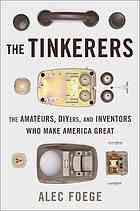
The Tinkerers
The Amateurs, DIYers, and Inventors Who Make America Great
کتاب های مرتبط
- اطلاعات
- نقد و بررسی
- دیدگاه کاربران
نقد و بررسی

October 29, 2012
Prompted by his experience repairing a broken smartphone, journalist Foege (Right of the Dial) investigates the tradition of tinkering: a type of free-form technical exploration that is fundamentally different from goal-oriented invention or corporate R&D. Foege argues that tinkering is particular to American society, sometimes produces revolutionary innovations, and has recently become more difficult as manufactured products become harder for consumers to modify, and institutional research becomes more centralized and tightly controlled. Notable tinkerers, Foege suggests, include the founding fathers, Thomas Edison, and modern icons of invention like Dean Kamen. Though these stories are mostly positive, Foege notes that for the financial industry, the tinkering mindset may have exacerbated the 2008 financial downturn by creating complex derivatives that weren’t well understood. In the book’s most thought-provoking sections, Foege considers the relationship between individual and collaborative tinkering, and how parents, schools, investors, and societies can foster the necessary mixture of curiosity, confidence, and opportunity. Although its depth is limited, this anecdotal exploration will be appreciated by readers interested in the quirky origins of technological advancement, and may inspire support for the next generation of unpredictable, revolutionary innovators. Agent: Paul Bresnick, Paul Bresnick Literary Agency.

November 15, 2012
A celebratory exploration of American tinkerers and the spirit of innovation that moves them. Thomas Edison may be the most famous tinkerer of all, but as former Rolling Stone and People contributor Foege (Right of the Dial: The Rise of Clear Channel and the Fall of Commercial Radio, 2008, etc.) points out in this lucid meditation on innovation, invention alone is a far different thing from tinkering. Tinkerers grab things that already exist and find clever ways of making them better or putting them to uses never before imagined. To illustrate his point, the author looks at great American tinkerers and finds that the compulsion to tweak existing technologies in unique and exciting ways is a hallmark of the American experience. Tinkering today, however, does have its challenges. For one thing, technology is a lot more complex than it was in Benjamin Franklin's day. Most people simply do not have the technical knowledge necessary to access the computerized world of virtual tinkering that predominates much of modern-day engineering. That wasn't the case in the past, when "gear heads" had far more tangible materials with which to work. Then there's the problem of the corporate state. Foege finds that it is choking truly creative inspiration in favor of immediate financial gains, and he effectively argues that real tinkerers need their own space and the freedom to fail. Coming up short is how tinkerers ultimately succeed. However, tinkering alone isn't a virtue; there's a dark side as well. In addition to Edison, readers also learn about the not-so-great men (and women) found tinkering in places like the military industrial complex and financial services industry - and how they almost brought the nation to its knees with their harebrained ideas. Still, tinkering remains a force to be reckoned with in the 21st century. Mostly laudatory history mixed with a provocative treatise on creating neat new things.
COPYRIGHT(2012) Kirkus Reviews, ALL RIGHTS RESERVED.

December 15, 2012
The word tinkerer has migrated far from its original definition as a repairer of utensils. In Foege's formulation, being a tinkerer is as much a state of mindcreative, obsessive, and unorthodoxas being someone who fixes or improves gizmos. Imagining a better gizmo is the tinkerer's hallmark, and the gizmo in Foege's demonstrations can be a device, methods of production, interstate highways, financial derivatives, even music. Individuals historical and contemporary furnish facts for Foege's search for what constitutes tinkering, which he feels is, to America's economic detriment, in decline and ought to be revived. Via journalistic portraits, including one of tinkerer nonpareil Thomas Edison, Foege extracts traits that cultivate tinkering. Foege's positive examples include the inventor of the Segway pedestrian vehicle, Dean Kamen, and the more famous Steve Jobs, both of whom characterize Foege's idea of the tinkerer as someone who doesn't take to formal education and creates gadgets and, more important, organizations that promote a tinkering spirit. (Ironically, Edison serves Foege as a negative example because of Edison's failure to commercialize his phonograph.) A lively exploration for those interested in technological innovation.(Reprinted with permission of Booklist, copyright 2012, American Library Association.)

























دیدگاه کاربران